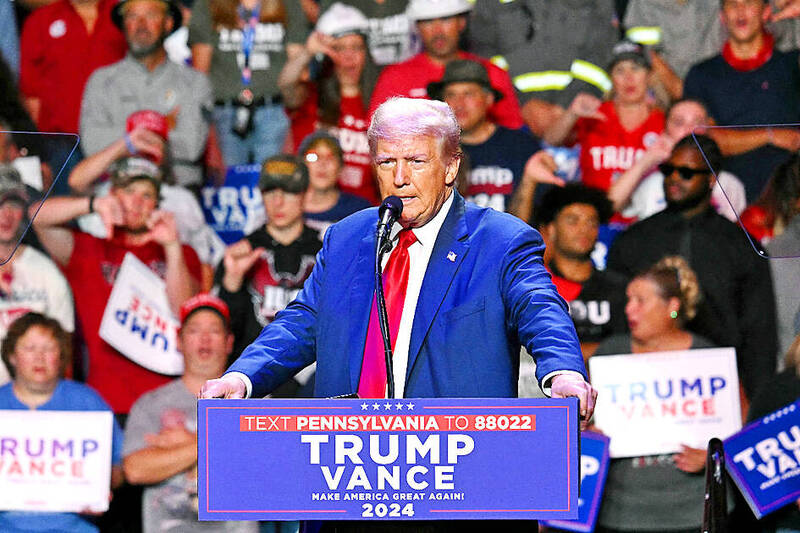《TAIPEI TIMES》Trump’s 10% defense demand panned

Former US president Donald Trump speaks at a rally in Pennsylvania on Wednesday last week. Photo: AFP
NO SUDDEN SPIKE:Kuma Academy’s Ho Cheng-hui said there is a consensus that Taiwan should increase its defense spending, but it should be an incremental increase
By Wu Che-yu, Liu Wan-lin and Jake Chung / Staff reporters, with staff writer
After former US president Donald Trump said that Taiwan should devote 10 percent of its GDP to the defense budget, lawmakers, political commentators and military experts said that he was imposing a difficult demand on Taiwan and no states focused on maintaining a strong military would have the capability to do it.
Radio talk show host Huang Wei-han (黃暐瀚) on Facebook yesterday said that Saudi Arabia has the highest national defense budget at 6.6 percent of GDP, with Israel coming in second at 5.2 percent.
The US dedicates 2.5 percent of its GDP to military expenditure, he said
Taiwan would have to spend NT$2.6 trillion (US$81.7 billion) per year on the defense budget to meet Trump’s demand, even though it only has a total annual budget of NT$3 trillion, he added.
Chinese Nationalist Party (KMT) Legislator Lee Yen-hsiu (李彥秀) said that Trump’s comments showed that he and his staffers’ understanding of Taiwan’s finances is far removed from reality.
Cross-strait relations are regressing, but the state has limited resources to distribute, she said.
Taiwan is not averse to spending money for its protection, but when the money has been spent, and the promised arms packages are repeatedly delayed, the public begins to question such expenses, she said.
Taiwan should prepare for the possible outbreak of war and seek alternative solutions to ensure that war is avoided, she added.
KMT Legislator Wang Hung-wei (王鴻薇) criticized the government for its meekness and silence, saying that while Taiwan would continue to work with the US, it should not allow such misguided notions to become mainstream as it would negatively impact the nation.
Taiwan People’s Party (TPP) Legislator Lin Yi-chun (林憶君) said Trump’s comments were just exaggerated talk geared toward boosting support for his presidential bid.
She said that Taiwan has limited resources and cautioned against hiking defense spending, as such a policy would not be to the benefit of the public.
Taiwan must consider how to rely on its own military forces to deter foreign aggression, Lin said.
The TPP’s stance on cross-strait issues is that Tawain should be prepared, capable and would not shy away from war, but it should not be actively bellicose.
Association of Strategic Foresight researcher Chieh Chung (揭仲) on Tuesday said that Trump’s unrealistic 10 percent defense spending demonstrated his unfamiliarity with the nation’s finances.
Chieh said that Taiwan’s GDP for next year is estimated at NT$26 trillion, 10 percent of which would comprise 84 percent of the nation’s expected annual expenditure of NT$3.13 trillion.
The increase would be six times the budgeted defense spending for next year, currently set at NT$476 billion, and would leave the government in deficit after paying the wages of civil servants, he said.
Chieh said that the defense budget has been boosted due to the Sea-Air Combat Power Improvement Plan Purchase Special Regulation (海空戰力提升計畫採購特別條例) and the Special Act on the Procurement of Updated Fighter Jets (新式戰機採購特別條例).
If Trump wins the US presidential election on Nov. 5, President William Lai’s (賴清德) administration would have to consider increasing military spending without undermining the overall budget, Chieh said.
Kuma Academy chief executive officer Ho Cheng-hui (何澄輝) on Tuesday said that Trump’s comments likely originate from Elbridge Colby, a senior defense official in his administration.
Colby expressed similar sentiments in an op-ed titled “Taiwan must get serious on defense,” in the Taipei Times on May 11.
“Given the massive disparity in military power in the Taiwan Strait, spending 5 percent of its GDP on defense should be the floor for Taiwan. Indeed, if its security and autonomy are at stake, why not spend 10 percent?” he wrote.
Ho said there is a consensus that Taiwan should increase its defense spending, but it should be a planned and incremental increase rather than a sudden spike that would jeopardize other government spending.
Additional reporting by Lin Che-yuan
新聞來源:TAIPEI TIMES
















